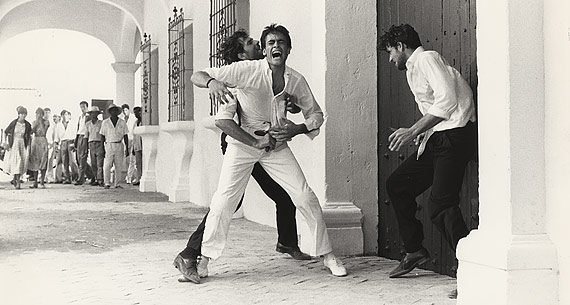
 Class Handouts:
Class Handouts:
Internet Resources--The Novel:
- This page for teachers, created by the book's U.S. publisher, has a good plot summary with analysis...and some questions and assignments for you, too.
- The Wikipedia entry on the novel contains some good insights.
- The novel was turned into a pretty bad film, which you can find on YouTube (as long as the poster isn't forced to take it down for copyright reasons) in 10 parts. The murder, the climax of the book and film, is in this section, around minute 8:39. Warning: Although the stabbing itself is brief, it's pretty realistically presented. The photo I've used on this page to the left is a still from the film.
Context for the Interactive Oral:

- An excellent, perhaps lengthy, online biography of García Márquez is on Alan Ruch's The Modern Word, a site dedicated to modern authors, well-known and lesser-known.
- The biography at Mental Floss should be really good, because it talks about how he uses incidents from his own life and background in his fiction...however, none of the examples are directly about Chronicle.
- García Márquez won the 1982 Nobel Prize for Literature. In his Nobel Lecture, he took a look at Latin America, its isolation and its aspirations: "Why think that the social justice sought by progressive Europeans for their own countries cannot also be a goal for Latin America, with different methods for dissimilar conditions?" (This lecture, and his Banquet Speech, are available on the site in Spanish, as well.)
- Here is some background on the real murder that inspired the fictional killing of Santiago Nasar in the novel.
- Another man claimed to be the real life Bayardo San Román, and later demanded that he receive half the royalties from the novel as compensation for García Márquez "stealing" his character and story for the novel. The case was eventually dismissed, as this article in the British newspaper The Guardian reports.
- Consider discussing the concept of honor killings. "Honor killings" usually involve a female's male relatives killing her because she has "dishonored" the family. In Chronicle, the killing is of a man. Does is fit the definition of an honor killing? Start at the Wikipedia entry (read the introductory information; then scroll down to Latin America).
- There is a more emotionally biased entry on honor killing on the webpage of the organization Violence Is Not Our Culture. Again, it concentrates mainly on honor killings in Muslim countries, but briefly deals with inequalities of the law and double standards in Latin America, as well.
- Amnesty International notes that while honor killings are more common elsewhere, there are also honor killings in the United States.
- Related to that is the Latin American concept of machismo. Zona Latina has an interesting article on the subject (including the percentage of Colombians who completely agree with the statement "A woman's place is in the home"). They also have an interesting breakdown of who does and doesn't believe that "Real men don't cry."
- How common is premarital sex in Colombia? That question and many, many others are investigated in a long, detailed (not for the modest!) article in the International Encyclopedia of Sexuality. This link jumps to the middle, and adult sexual behavior. Can you then find information comparing those statistics to statistics in the United States?
- BBC Reporter Richard McColl took a tour of Colombia "in search of places that have inspired García Márquez". (Note that this article is about the town where García Márquez was born, not Sucre, where he lived for a time and which is the basis for the setting of Chronicle.)
- I enjoyed this reflection by García Márquez on one of his own literary heroes, Ernest Hemingway.

 Class Handouts:
Class Handouts:
